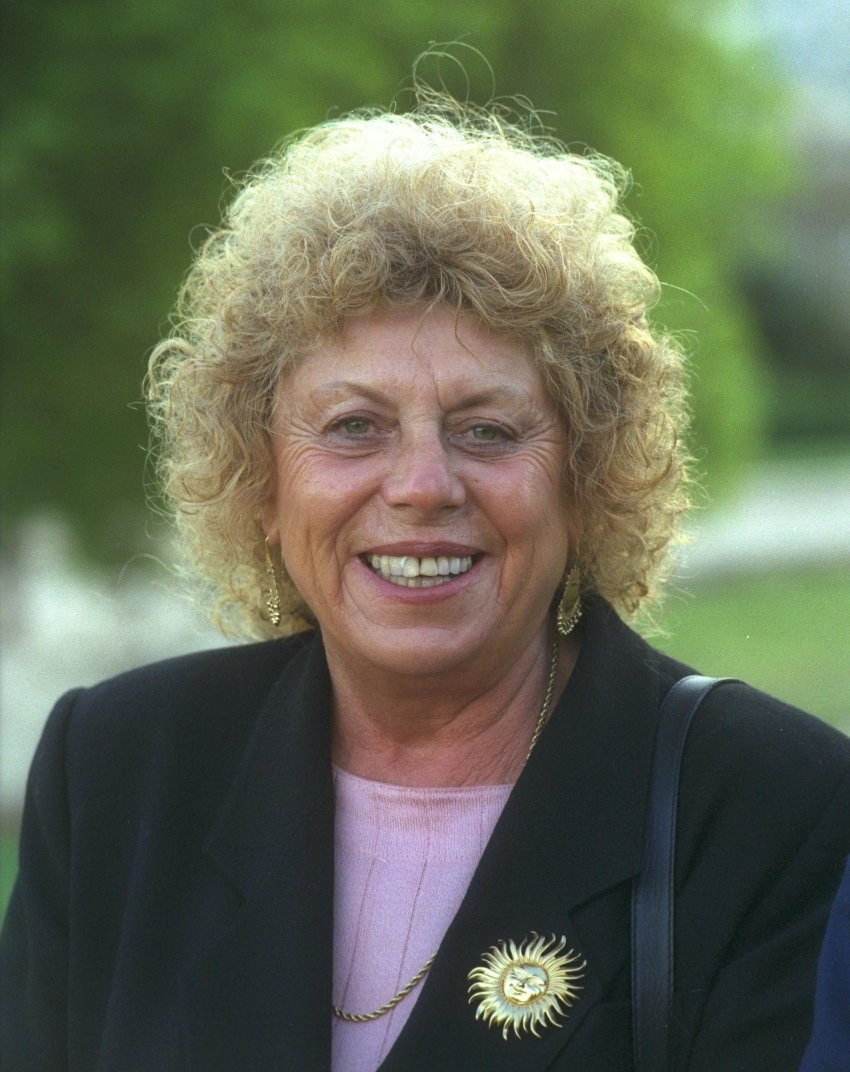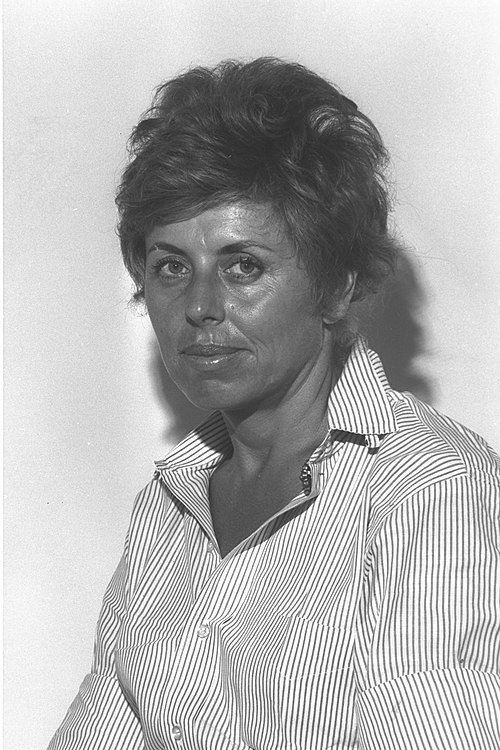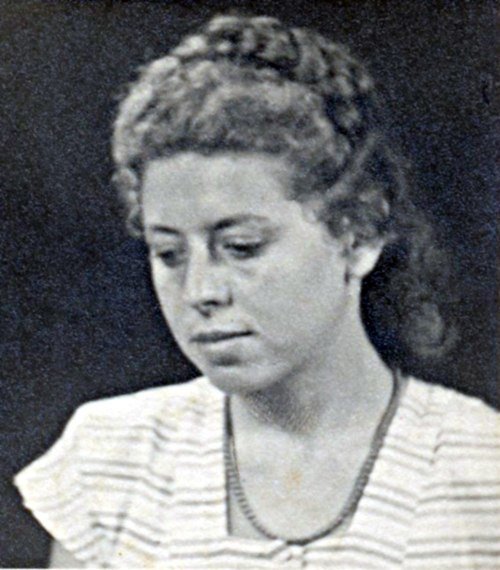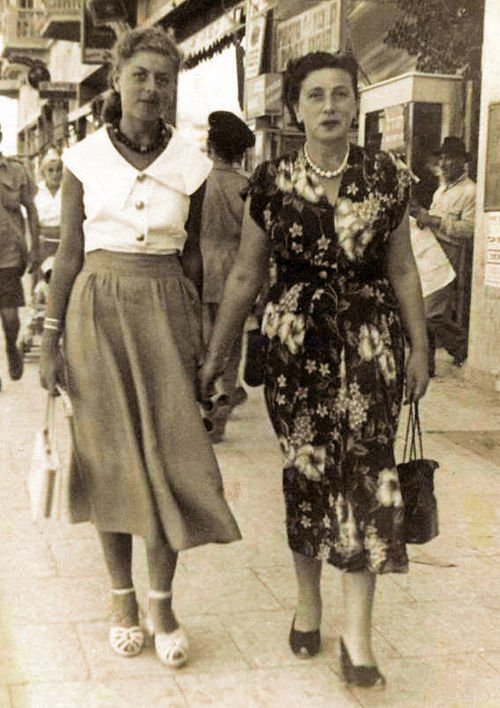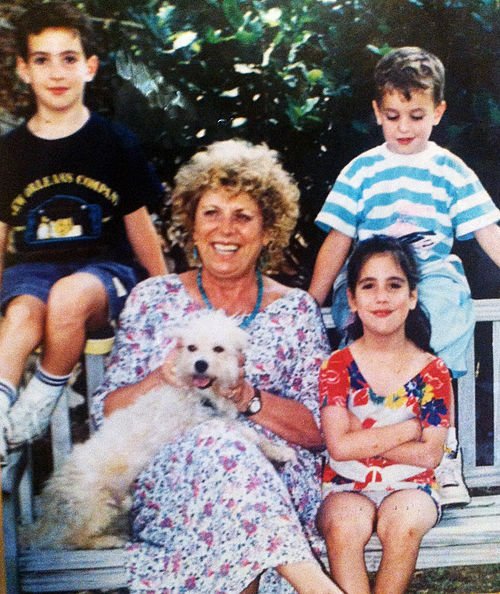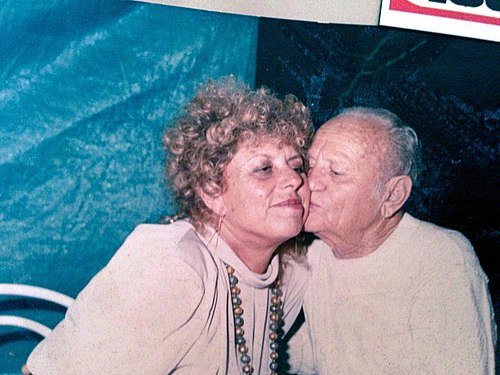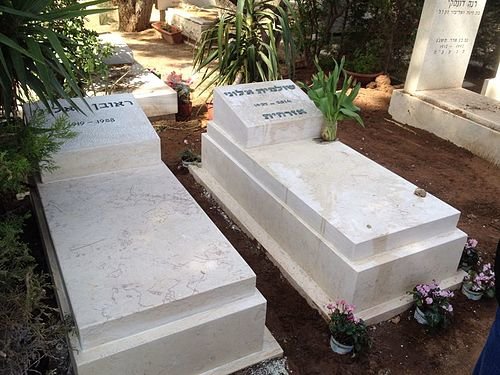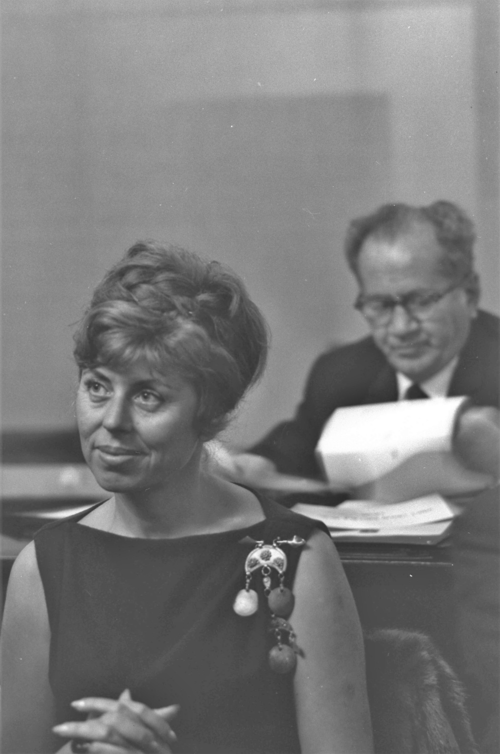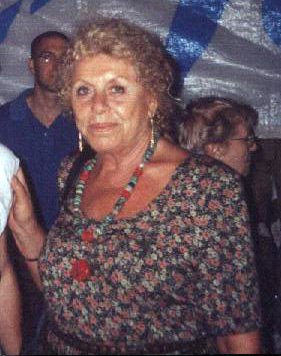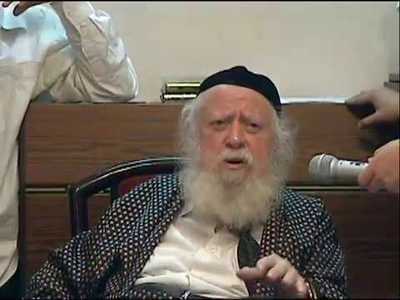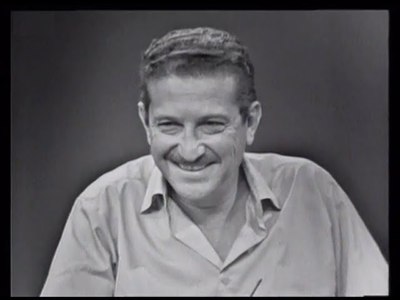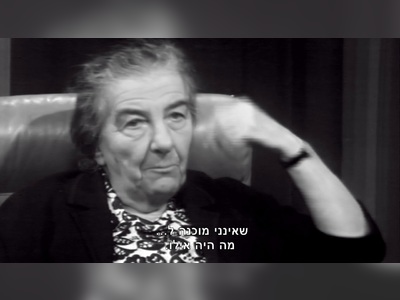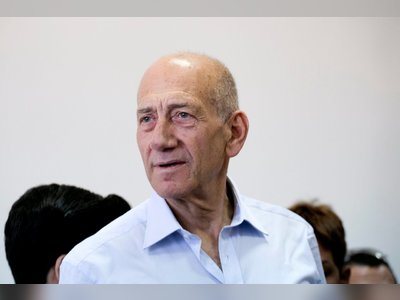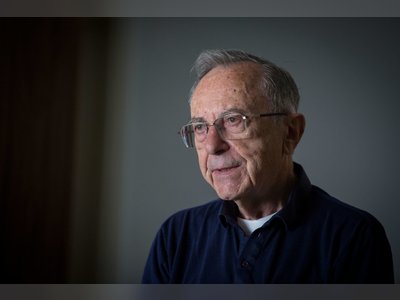Shulamit Aloni: A Life of Social Activism, Politics, and Advocacy
Shulamit Aloni (December 27, 1927 – January 24, 2014) was a prominent Israeli social activist, Member of the Knesset (Israel's parliament), and government minister. Her political career began with the establishment of the Movement for Civil Rights and then the leadership of the Ratz party, later known as Meretz.
Aloni was widely recognized as a champion of human rights and a prominent voice in Israel's left-wing politics. She was awarded the Israel Prize in 1990 for her exceptional contributions to the country and society.
In her political endeavors, Aloni focused on human rights, women's rights, the establishment of a welfare state, opposition to religious coercion, and the pursuit of a territorial compromise for the creation of a Palestinian state.
Before entering politics, Shulamit Aloni hosted popular radio programs for eight years, such as "Outside Office Hours," "The Topic in Treatment," and "Meet the Law." These programs addressed civil rights and consumer issues. She also authored several books, including the first Israeli citizenship textbook. Aloni also had a weekly column in the newspaper "Yedioth Ahronoth" and the magazine "La'Isha" for 22 years.
Biography
Shulamit Aloni was born as Shulamit Adler in Poland to Jewish parents, Leah and David Cohen Adler, in a family with two children. During her childhood, she immigrated with her parents to Israel and grew up in the Neve Sha'anan neighborhood in South Tel Aviv. Her father was a carpenter, and her mother worked as a seamstress, specializing in high fashion.
Both of her parents came from religious families: her father's father, Joshua Adler, was a rabbi who earned a living as a watchmaker, and her mother's father, Moshe Palushk, was a rabbi and a Zionist educator in Volozhin. Reflecting on her family's decision to immigrate to Israel, she later said, "I owe my existence to the decision of my parents, who were born in Poland, to rebel against the rabbis and immigrate to the land [of Israel]."
Her parents, known as "Blue-collar Zionists," had a Zionist-socialist orientation. While they observed Jewish holidays and Shabbat at home, they did not adhere to religious traditions.
The family lived in a poor neighborhood, and due to financial difficulties, they moved to cheaper apartments nearly every year. The neighborhood was home to Jewish immigrants from Eastern Europe and new immigrants, and Aloni became friends with their children and learned to speak Yiddish.
She recalled, "I grew up with the feeling that I had to take care of the house." At the age of four, she began looking after another child, and later, she took on house cleaning and worked on laundry. By the time she was in seventh grade, she was mostly out of the house. "Until then, I felt responsible for the home."
Rosa Cohen, a member of the Tel Aviv City Council representing the Workers' Party (and the mother of Yitzhak Rabin), ensured that Aloni was admitted to the "Beit Hachinuch" school, part of the Workers' Movement in Tel Aviv, which provided extended day studies with lunch.
She studied there from first to third grade. After Cohen's death in 1937, the subsidy for Aloni's education (a benefit provided to union workers) was discontinued, and she and her younger brother, Mordechai, who joined her in the meantime, could not afford the full tuition.
As her father could not afford to pay for her education, she moved to the "Yisud Hamahala" school until the end of eighth grade. Among her teachers were the artist Jenny Berg, who taught handwork, painter Itzhak Hirschkowitz, who taught art, and poet Dov Chomski, who taught Hebrew.
When she reached seventh grade, World War II broke out. Her father was drafted into the British Army's Royal Engineers, and her mother volunteered for service. Aloni joined a group of "Aliyot" in the cooperative settlement of Ra'anana, where youth from Russian or poor homes were accepted.
They lived in tough conditions, worked to cover their expenses, and collected food leftovers from the settlement because of food shortages. In Ra'anana, the children of the group studied with the children from the settlement in the school, under the supervision of Ben-Zion Zilstein (Zaltzin). After school hours, they spent time in the "Youth Worker's Club."
Aharon and Mati Magid, sons of the Bible teacher Moshe David Magid (Greenberg), were their "cultural heroes" (Aloni met Shulamit Aloni the actor, not the politician, in this group).
When her brother Mordechai was 12, he drowned in a swimming pool in the Ben Shemen Youth Village. In an interview conducted several years later, she said, "They said he fell into the pool, but I always had a suspicion, to this day, that he committed suicide due to all the troubles.
He was much more sensitive than me about the whole issue." She described the impact of his death on her family: "His death affected us all for a long time; it attacked the household. My parents, who were not in the country at the time, were morally torn apart." Years later, she revisited the subject and said, "There was a great pain in the house.
Everyone talked for a long time, including me and them. Everyone had their own package of troubles. It was a conversation without words, but it was. It was all the time. I don't think they blamed themselves. The pain was great, I don't know how to analyze it, I was too young to analyze it. I was 13, but I was not with my parents. They were in the army, and I traveled a lot to Alumot, Poria, and Beit Nehemia."
Following her brother's death, it was decided to move her from Ra'anana to the Ben Shemen Youth Village. She studied at the institution until the end of 11th grade and also worked there, primarily herding sheep, to cover her expenses.
In Ben Shemen, she became close friends with Sonia Gelman (who would later become Shimon Peres's wife), who was older than her and lived in the village because her father was one of the teachers. (Sonia Gelman was the one who found Aloni's brother's body). Among her teachers at Ben Shemen was S. Yizhar, Aryeh Löwdöwic Strauss, and Ze'ev Friedland.
During her adolescence, Aloni joined the "HaHagana" organization while still a student in Ben Shemen. She was immediately enlisted, and at the age of 16, she pretended to be pregnant to smuggle weapons. During the Israeli War of Independence, she served in the Palmach and later became a mother in the Jewish Quarter of the Old City of Jerusalem during the siege.
Thus, she combined teaching duties with military defense activities. Her partner, Lipkin, enlisted in the Jerusalem Brigade to be near her, and on March 18, 1948, he was killed in the battle of Har-Tuv.
While still a student at Ben Shemen, she began studying psychology at the Hebrew University in Jerusalem, and at the same time, she began working as a teacher in Kibbutz Ein Hahoresh. Upon graduating, she continued her studies and received a bachelor's degree. Aloni's thesis dealt with the topic of love in Dostoevsky's novels.
During her studies, she joined the "Bnei Akiva" movement. This decision was influenced by the "Brit HaNoar HaYisraeli" youth movement, led by Yosef Shapira, which she joined while still in school. However, in the "Brit HaNoar HaYisraeli," she experienced internal disputes that contributed to her alienation from it.
After graduating, she worked as a teacher in Ein Hahoresh. When she requested to leave for a year for maternity leave, the Kibbutz Assembly decided to dismiss her, arguing that she had lied when she joined the kibbutz, claiming that she would dedicate her life to it. Aloni considered the dismissal a political act against her: "I said, 'The hell with you, you hypocrites.' I was really angry.
They sent a person to bring me the expulsion letter; the thing had come from a committee to my amazement. I always wondered who would bring it to me, and a sweet girl from Beit Yosef came to me and brought the letter. I saw the address and didn't read it and thanked her for coming and made her tea. It was winter, and she stood there and wanted to leave.
I couldn't, I asked, 'Why are you standing?' She said, 'You should read the letter,' and I said, 'I know, it's a dismissal letter.' And she said, 'How did you know?' And I said, 'I know.' Afterward, I went to Ein Hahoresh and packed my things."
After leaving Ein Hahoresh, she worked for the "Hanoar Haoved" movement, where she continued to educate. During this time, she married Reuven Aloni, with whom she had three children: Nimrod, Udi, and Yael. They later divorced, and Aloni married Eliyahu Eyal, an economist and head of the Friends of the Hebrew University of Jerusalem. She had one child with him, her son Gilad. In the early 1960s, she completed her master's degree in psychology and education at the Hebrew University in Jerusalem.
Shulamit Aloni's Political Career
Aloni's political career began in the early 1970s when she founded the Movement for Civil Rights in Israel, a non-governmental organization dedicated to promoting civil rights and opposing religious coercion. She was a vocal advocate for the separation of religion and state in Israel, arguing for greater religious pluralism and individual freedoms.
In 1973, she was elected to the Knesset as part of the Ratz party, which later became known as Meretz. During her time in the Knesset, Aloni continued her advocacy for civil rights, women's rights, and peace. She was a leading voice in the Israeli peace movement and supported negotiations with the Palestinians.
Aloni served as a government minister in several Israeli cabinets. She held positions such as Minister of Education and Minister of Communications. In these roles, she worked to advance her progressive agenda, including promoting a more inclusive and diverse education system.
One of Aloni's most significant legislative achievements was the passage of the Equal Rights for Persons with Disabilities Law in 1998, which aimed to protect the rights of individuals with disabilities and ensure their inclusion in various aspects of Israeli society.
Throughout her political career, Shulamit Aloni was known for her passionate and principled approach to social justice issues. She continued to be a prominent figure in Israeli politics until her retirement from the Knesset in 1996.
Legacy
Shulamit Aloni's legacy in Israel is multifaceted. She is remembered as a tireless advocate for civil rights, social justice, and peace. Her efforts to challenge religious coercion and promote a more open and inclusive Israeli society left a lasting impact.
Aloni's work in education, especially her focus on promoting tolerance and diversity in the classroom, has also had a significant influence on Israeli society. She believed in the power of education to shape a more equitable and compassionate future for Israel.
Despite facing criticism and opposition from various quarters throughout her career, Shulamit Aloni remained committed to her ideals and principles. Her willingness to speak out against injustice and her dedication to building a more inclusive Israel continue to inspire activists and policymakers today.
Shulamit Aloni passed away on January 24, 2014, but her legacy as a champion of civil rights and social justice lives on in the hearts and minds of those who continue to work towards a more equitable and peaceful Israel.
- שולמית אלוניhe.wikipedia.org
